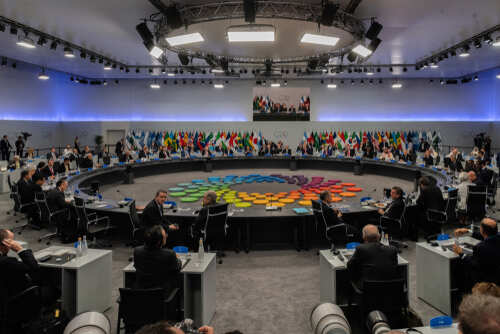President Trump’s decision to potentially boycott the G20 summit in South Africa over what he calls “very bad policies” has set off a diplomatic firestorm and put the spotlight on South Africa’s controversial land expropriation law and its recent accusations against Israel—while the White House makes it clear that America’s patience for global leftist experiments has run out.
At a Glance
- President Trump signals he may skip the 2025 G20 summit in Johannesburg, citing South Africa’s land expropriation law and hostile stance toward Israel.
- The White House criticizes Pretoria’s “bad policies,” including land grabs from white farmers and support for anti-Israel rhetoric.
- U.S.-South Africa relations have reached a new low, with tariffs, aid bans, and a diplomatic snub all in play.
- South Africa continues to defend its land reform as overdue justice, while critics warn of economic harm and political chaos.
Trump Draws a Red Line on South African Land Seizures
President Trump’s announcement that he may skip the November G20 summit in Johannesburg comes as no surprise to anyone who’s watched the steady unraveling of sanity in international diplomacy. Trump minced no words: South Africa’s new Expropriation Act, which allows the government to seize land without compensating its rightful owners, is “very bad policy”—and he’s right. When a government can take your land simply because you were born with the wrong skin color, that’s not “justice”—that’s theft, pure and simple. Trump’s refusal to lend American legitimacy to such policies sends a message: the United States won’t play along with radical social engineering, even if it means skipping the global elite’s favorite talking shop.
In May, Trump drove the point home by playing videos at a White House meeting that depicted violence against white South African farmers. He’s not alone in calling out what many see as a targeted campaign against the country’s white minority. Elon Musk, South African-born and never one to shy away from controversy, has amplified these claims, fueling the debate over whether Pretoria’s land reform is about economic justice or something much darker.
U.S.-South Africa Relations Hit Rock Bottom
Since January, when South Africa’s ruling party rammed the Expropriation Act through parliament, relations with the United States have plummeted. The White House responded with a one-two punch: a 30% tariff on South African goods and an outright ban on foreign assistance to the country. The administration has also issued new rules making it easier for white South Africans to claim asylum in the U.S., a move that’s drawn fire from the usual leftist critics—who, as always, are more concerned with slogans than with facts on the ground.
President Ramaphosa, for his part, claims his government is simply correcting the injustices of apartheid. According to him, “A refugee is someone who has to leave their country out of fear of political persecution… They don’t fit that bill,” referring to Afrikaners seeking asylum. But when your government passes laws that target a minority and when violence against that group is on the rise, you’d be forgiven for thinking that’s persecution by any common-sense standard.
Land Reform or Land Grab? The Debate Intensifies
Supporters of the Expropriation Act insist it’s a long-overdue correction for decades of racial discrimination under apartheid. But critics—including the U.S. administration, many American lawmakers, and a growing chorus of international observers—see something very different. They point out that while the law is supposed to be constitutionally limited and subject to judicial review, in practice it’s opened the door to arbitrary seizures, economic chaos, and a dangerous precedent for property rights. The Council on Foreign Relations calls Trump’s policy “misguided” but admits the Expropriation Act remains controversial and fraught with risk.
The law’s defenders argue that there’s no systematic campaign against whites and that farm attacks affect all South Africans, black and white alike. Yet, the facts remain: South Africa’s economy is reeling, foreign investment is drying up, and the country’s international reputation is in tatters. U.S. businesses with ties to South Africa are already feeling the pain of tariffs and aid bans, while the G20 summit itself now hangs in the balance.
Global Fallout and a New Era of America First Diplomacy
By linking U.S. participation in the G20 summit to South Africa’s domestic and foreign policies, President Trump is doing what globalists despise: using America’s economic and diplomatic clout to draw a hard line against radical leftist experiments. The message is as clear as it gets—if you want to attack property rights, undermine stable societies, and push anti-Israel rhetoric on the world stage, don’t expect a handshake and a smile from Washington.
Some in the diplomatic class are wringing their hands over “multilateral cooperation” and “global economic stability,” but the truth is that these summits have become little more than echo chambers for failed ideologies and bloated bureaucracies. The American people are sick of being told to fund the world’s bad ideas while our own borders, industries, and families pay the price. If President Trump chooses to send a representative instead of attending in person, it will be a much-needed reminder that America has no obligation to legitimize failed states or appease the global left.
Sources:
ABC News: Trump administration faces criticism for prioritizing white South African asylum claims.
Council on Foreign Relations: Analysis of Trump’s policy and South Africa’s Expropriation Act.
White House: Official executive order and policy statements.
Click this link for the original source of this article.
Author: Editor
This content is courtesy of, and owned and copyrighted by, https://libertynewsalerts.com and its author. This content is made available by use of the public RSS feed offered by the host site and is used for educational purposes only. If you are the author or represent the host site and would like this content removed now and in the future, please contact USSANews.com using the email address in the Contact page found in the website menu.





